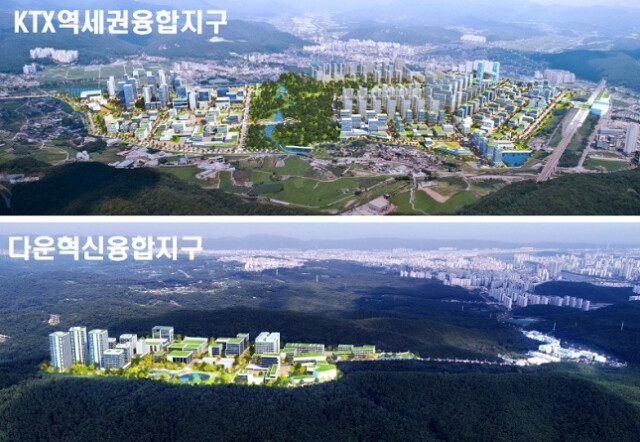
ULSAN, South Korea – The ambitious Ulsan Urban Convergence Special Zone development project is set to accelerate following the official designation of the Ulsan Urban Development Corporation (UUDC) as its sole implementer. This crucial step, jointly announced today by the Ministry of Land, Infrastructure and Transport (MOLIT) and Ulsan Metropolitan City, marks a significant milestone since the project's master plan received approval on November 7 of last year.
The designation of a dedicated implementing body is expected to inject considerable momentum into the large-scale initiative, which aims to transform Ulsan's urban core into a dynamic, integrated hub fostering industrial growth, residential solutions, and cultural amenities. The overarching goal of the Urban Convergence Special Zone is to stimulate corporate investment and create a plethora of new job opportunities for young people within the city.
A Dual-Zone Approach to Innovation and Growth
The Ulsan Urban Convergence Special Zone is strategically divided into two distinct yet complementary areas: the KTX Station Area Convergence Zone, spanning approximately 1.62 million square meters, and the Dowon Innovation Convergence Zone, covering an area of around 300,000 square meters. The combined project is projected to attract a substantial investment of KRW 3.57 trillion (approximately USD 2.6 billion, based on current exchange rates) by its targeted completion in 2034.
KTX Station Area Convergence Zone: Fostering Strategic Industries and Talent Retention
The KTX Station Area Convergence Zone is envisioned as a nexus for key strategic industries and a robust ecosystem for entrepreneurial growth. Plans for this expansive zone include:
Second-Generation Battery Strategic Industry Cluster: This will be a cornerstone of the zone, focusing on research, development, and manufacturing related to advanced battery technologies, a critical sector for South Korea's future industrial landscape.
Startup Incubation and Post-Incubation Cluster: Designed to nurture nascent businesses, this cluster will provide essential resources, mentorship, and a supportive environment for startups to thrive beyond their initial stages of development.
Agricultural Technology Innovation R&D Hub: Reflecting a commitment to diversifying Ulsan's economic base, this area will be dedicated to cutting-edge research and development in agricultural technologies, potentially fostering sustainable practices and new agro-industries.
Job-Linked Customized Residential Areas: To encourage young talent to settle and contribute to the local economy, the zone will develop specialized housing solutions directly linked to employment opportunities, addressing potential housing challenges and promoting long-term residency.
International School Establishment: Recognizing the importance of attracting foreign investment and skilled international workers, plans are underway to establish an international school. This facility will cater to the educational needs of children from foreign companies and technology professionals, making Ulsan a more appealing destination for global talent and their families. This initiative aligns with broader national efforts to create globally competitive urban environments.
Dowon Innovation Convergence Zone: Research, Development, and Climate Tech Leadership
The Dowon Innovation Convergence Zone is poised to become a significant center for research, development, and the cultivation of innovative industries, particularly in the burgeoning field of climate technology. Key components of this zone include:
Demonstration Research Center and R&D Complex: These facilities will serve as vital platforms for advanced scientific inquiry and technological development, fostering collaboration between academia, industry, and research institutions.
Attraction of Two National Research Institutions: The zone aims to attract two leading national research institutions to act as "anchor tenants." Their presence is expected to draw in a cluster of related companies, creating a synergistic environment for innovation and commercialization.
Integrated Business Support Center: This center will provide a comprehensive suite of services for businesses, including co-working spaces for startups and crucial technology-based support. A particular focus will be on nurturing climate tech startups, offering them resources for growth, and fostering the development of a skilled workforce in this critical area. This aligns with global trends in sustainable development and green technology.
Official Statements and Future Outlook
Kim Ji-yeon, Director-General for National Land Policy at the Ministry of Land, Infrastructure and Transport, emphasized the government's commitment to the project: "Now that the implementer for the Ulsan Urban Convergence Special Zone development project has been designated, we will spare no effort in providing the necessary support to ensure the project proceeds with speed and efficiency."
Lee Jae-gon, Director-General of Ulsan Metropolitan City's Urban Bureau, highlighted the city's proactive role: "Moving forward, we will actively work to connect various corporate, university, and business support programs from different ministries within the Urban Convergence Special Zone. We will also identify eligible projects for financial support to accelerate the zone's revitalization."
Ko Ho-geun, Head of the Ulsan Urban Development Corporation, outlined the immediate next steps: "We plan to complete the necessary preliminary procedures and establish the implementation plan, aiming to finish the land 조성 (land preparation/development) work by 2029." This timeframe suggests that significant on-site construction and development will begin in the coming years, bringing the vision of the Urban Convergence Special Zone closer to reality.
The Ulsan Urban Convergence Special Zone represents a significant strategic investment by both central and local governments, poised to redefine Ulsan's urban landscape, foster new industries, attract talent, and solidify the city's position as a hub for innovation and economic growth in South Korea. The successful execution of this project is expected to have a far-reaching positive impact on the region's economy and its ability to compete on a global scale.
[Copyright (c) Global Economic Times. All Rights Reserved.]






























